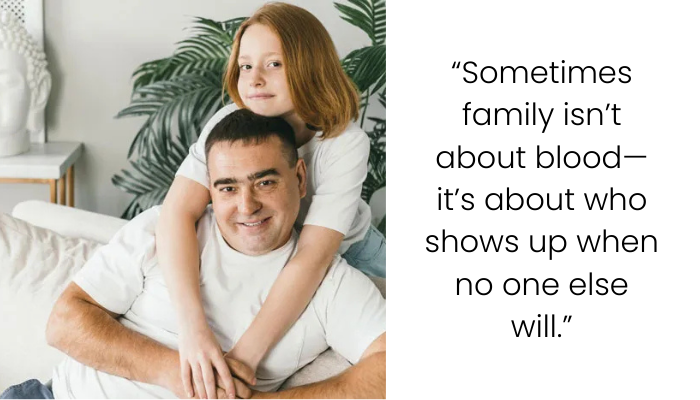AITA for letting my ex-stepdaughter keep a “love nest”?
OP (48M) had a strong father-daughter bond with his stepdaughter, Lana (18F), whom he raised from age 6 until a divorce shattered the family. The split happened when OP discovered his wife (38F) had been cheating with her ex (Lana’s biological father), who soon moved back in with her after the divorce.
Lana, who never had a close bond with her biological father, was thrust into a highly traditional and hostile environment. Her dad was dismissive, sexist, and placed heavy restrictions on her, like forbidding her from dating. This double standard didn’t apply to her brothers. After a big fight shortly after turning 18, she walked out of that home with nowhere to go.
OP, seeing her struggle, offered her a lifeline: one of his old Airbnb units, rented below market value, no curfew, and full autonomy. Now she works, studies at a community college, and lives freely. But her mother and bio-dad aren’t happy about it. They accuse OP of creating a “love nest” and enabling her defiance.
Is he overstepping boundaries, or just keeping a promise to be there for a daughter who’s been failed by everyone else?
When a marriage ends, the complicated bond between a stepparent and child is often tested
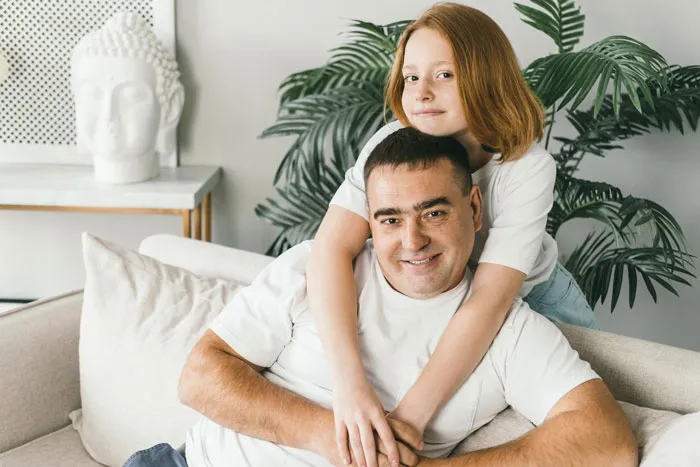
After a 10-year marriage ended, a stepdaughter found herself under the roof of a controlling father
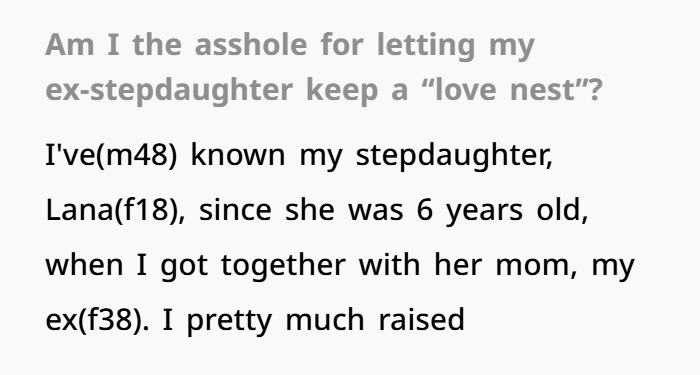
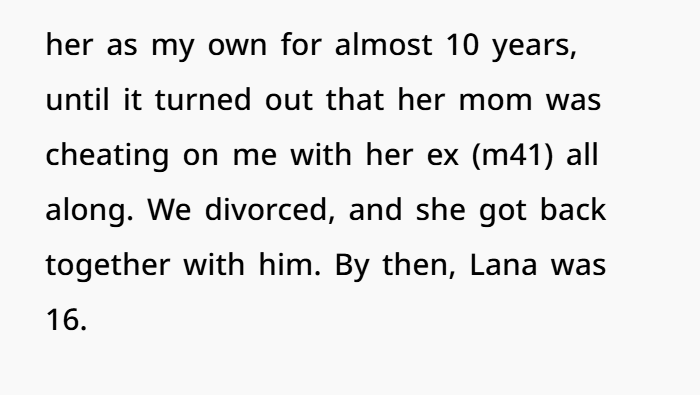
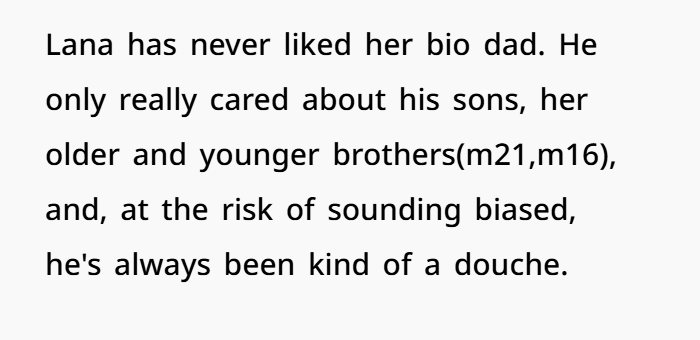
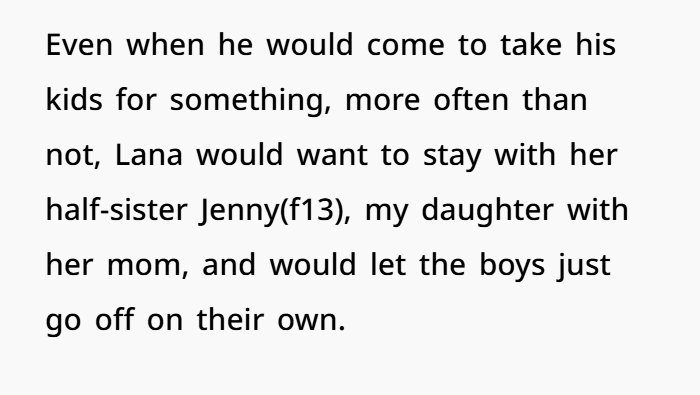

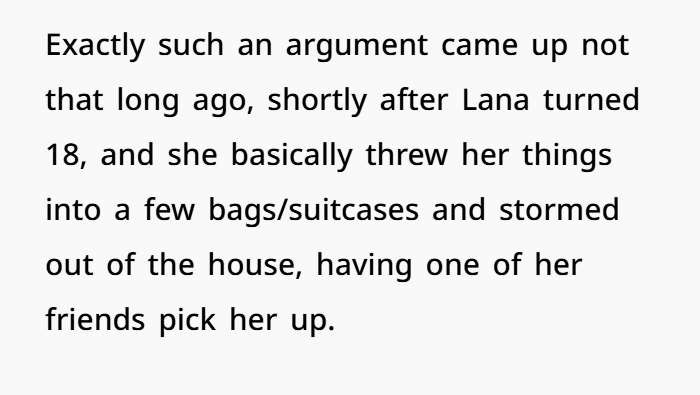
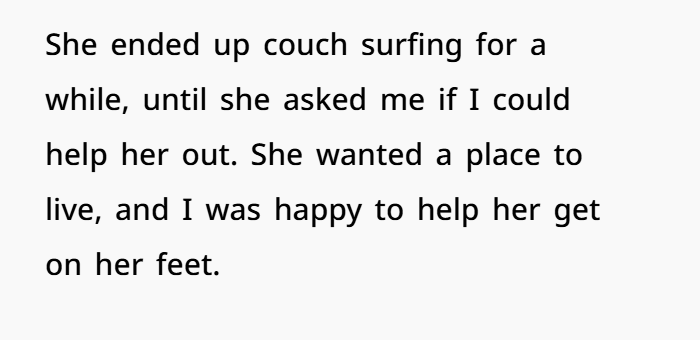
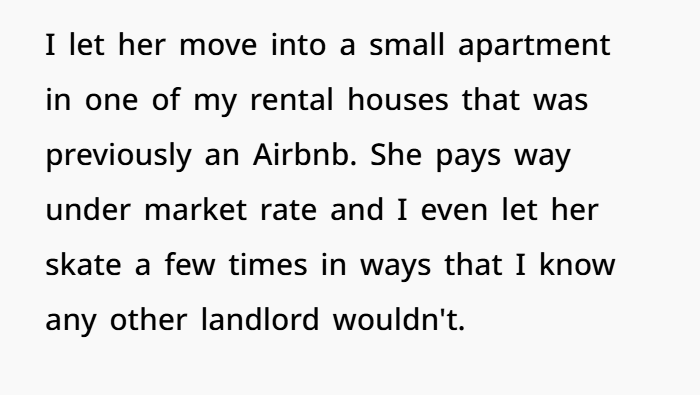


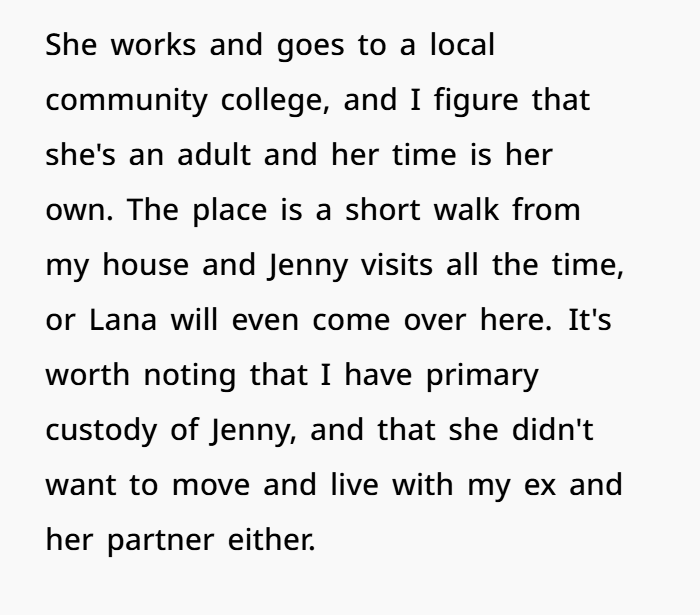
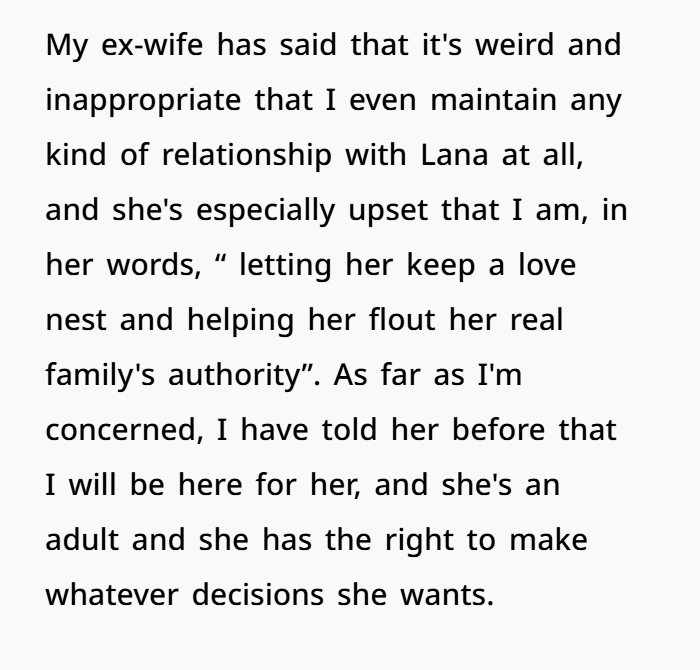
The Real Cost of Cutting Off a Toxic Home—And Why OP Isn’t the Bad Guy Here
Let’s just say it up front—you’re not the asshole.
This isn’t about “stealing” a kid from their parents. This is about being the only adult in Lana’s life who actually treats her like a human being. So let’s break down why you’re not only not the problem—but maybe the only one doing anything right in this mess.
1. Stepping Up When the “Real Parents” Stepped Down
Let’s talk about what actually makes someone a parent. It’s not DNA, it’s not legality—it’s showing up, over and over again, especially when things are hard.

You raised this girl for a decade. You watched her grow. You were there for her milestones. Even when the relationship with her mom ended, your connection with Lana didn’t suddenly become invalid. You were her dad when her actual dad couldn’t be bothered.
And now? She’s legally an adult, abandoned emotionally by both of her biological parents, and you’re the only one giving her a safe space. That’s not weird. That’s parenting.
2. “Love Nest” Accusations Are Just a Distraction From the Real Problem
Your ex-wife’s language—“love nest”—is telling. She’s not really concerned about Lana’s well-being. She’s angry she can’t control her. The same goes for Lana’s bio-dad.
Let’s be real. The “real family’s authority” she refers to is deeply flawed:
- They impose gendered double standards
- They emotionally neglect her
- They only care when they can’t keep tabs on her
Supporting someone’s independence isn’t enabling bad behavior—it’s empowering autonomy.
3. Adult Children Aren’t Property
One of the most dangerous ideas out there—especially in traditional households—is the belief that children owe loyalty to parents just because they’re parents.
But when a child becomes an adult, they get to choose their relationships.
Lana’s “real parents” are using phrases like “flouting authority” because they see her as something to be managed, not someone with her own mind. They don’t want her to have boundaries. And let’s not ignore the blatant sexism in all of this: her brothers can date freely, but she can’t?
That’s not parenting. That’s control.
You giving her the option to live rent-safe, free, and supported is the opposite of controlling. You’re giving her freedom. Something her other guardians clearly never could.
4. You’re Not Her Landlord—You’re Her Lifeline
You’re not just a guy renting out a property. You’re a lifeline to a young adult who had no one else.
Let’s not forget:
- She’s working
- She’s studying
- She’s not freeloading
- She’s not creating drama
- She’s not mooching off you
She’s doing exactly what society expects of 18-year-olds—trying to find her way. The only difference? She’s doing it with your help instead of struggling on the streets.

If her parents really cared about her success, they’d be proud she’s working and going to school. Instead, they’re worried about who she’s dating and what time she gets home. That’s messed up.
5. Emotional Incest & “You’re Not Her Dad” Gatekeeping
Let’s hit something hard here: sometimes, parents get weirdly territorial—not out of love, but out of shame, guilt, or jealousy.
Your ex’s comments suggest emotional gatekeeping. She wants to say, “You’re not her dad anymore,” because it validates her own neglect. But the truth is, she forfeited that role when she failed to stand up for Lana in her own home.
6. Protecting Your Daughter Means Protecting Lana, Too
Your younger daughter, Jenny, clearly feels safer with you. That’s already telling. But let’s not forget that keeping Lana nearby also helps Jenny.
She has an older sister who models strength, independence, and healthy boundaries. They spend time together. They bond. That’s not dysfunction—it’s family health.
You’re not choosing Lana over Jenny. You’re choosing both of them.
Online commenters overwhelmingly praised the author as the ‘real dad’ and condemned the ex-wife’s behavior
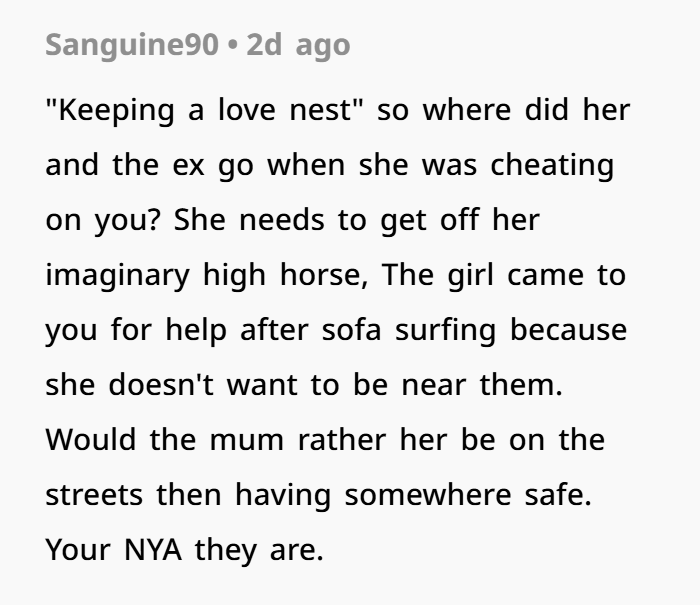
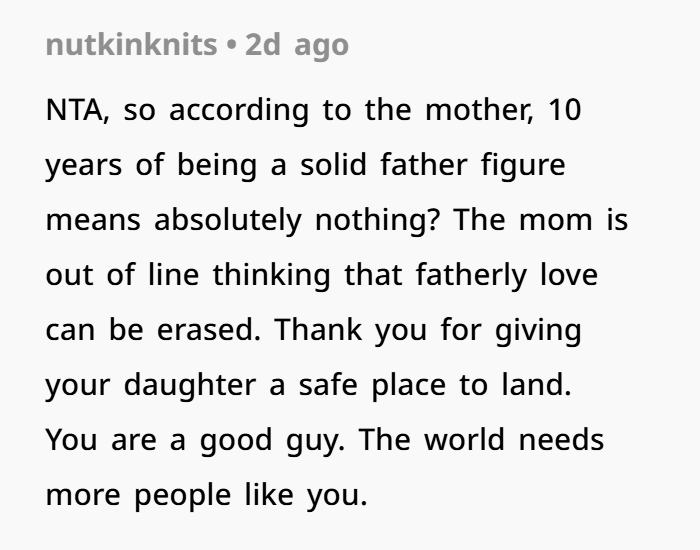
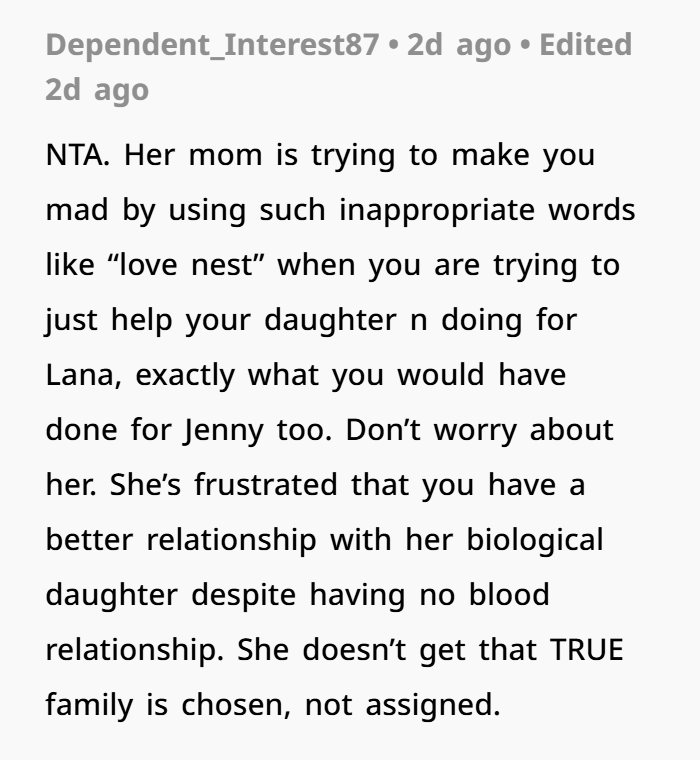
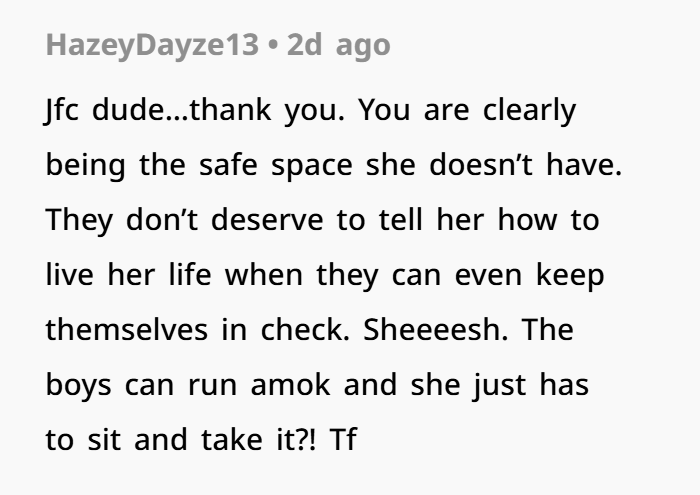
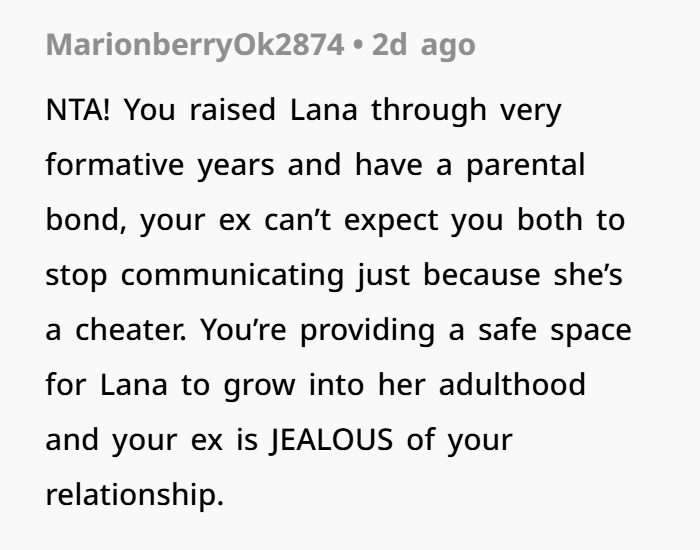
Let’s recap:
- You raised Lana like your own for 10 years
- You stepped up when her “real” family failed her
- You provided safe, low-cost housing
- You’re supporting her education and independence
- You’re respecting her autonomy
- And you’re not doing it for praise or control—just because it’s the right thing
Your ex and Lana’s bio-dad are trying to twist this into something it’s not because it makes them feel bad. Not because you’re in the wrong.
You’re doing what good parents do: show up, support, and step back when necessary.
And that’s more than they’ve ever done.

